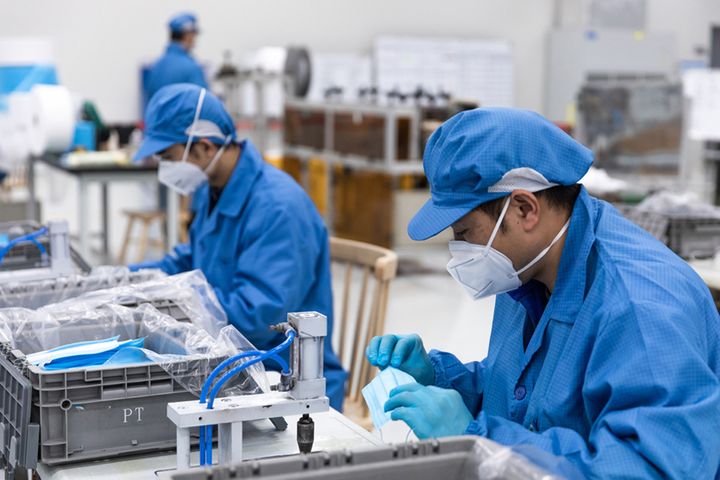 China's Most Popular Carmaker Comes Up With Machine to Make Face Masks
China's Most Popular Carmaker Comes Up With Machine to Make Face Masks(Yicai Global) March 17 -- SAIC-GM-Wuling Automobile, maker of the iconic Wuling Sunshine minivan featured on the cover of Forbes Magazine in 2010, has developed its own mask-making machinery to produce face masks as the country faces a severe shortage during the novel coronavirus epidemic.
Mountains of boxes of masks bearing the slogan 'Wuling makes what people want'
stand outside a car factory in Liuzhou, Guangxi province ready to be delivered. So far, the firm has given away all the protective gear to the local government as well as to its own suppliers and dealers.
Since yesterday, anyone who subscribes to the firm's app Linglingbang, which offers 24-hour online car purchase and maintenance services, can have some for free. Over six million face masks are expected to be distributed in this way.
When the epidemic first broke out, the joint venture between Shanghai's SAIC Motor, General Motors and Guangxi Automobile Group bought 20,000 surgical masks from Indonesia and India to protect its staff. But the firm it found it impossible to keep doing this as many countries later banned the export of this protective gear.
Mask Making
The factory then looked at making its own masks. That was also not straightforward.
"It took a lot of effort, but we finally tracked down four production lines in different parts of China," said project manager Wu Meihui. "Two of them were 11 years old and had been idle for the last three years. It wasn't even possible to find the key parts needed to repair them.
"So we decided to make out own face mask machine," she added.
The JV formed a special team of over 120 experts and technicians. It took them 24 hours to complete the design. Despite the epidemic control efforts hampering transportation and delivery, they were able to source 2,200 spare parts from 760 different types of spares.
A little over three days later the machine was complete and on Feb. 19 Guangxi's first mask-making apparatus rolled off the production line. Normally it takes up to 20 days to produce this equipment.
Since then, the JV has built 22 automated mask lines that can produce up to 2 million face masks a day. There are more than 400 people in the team.
Plummeting Sales
Wuling was China's top-selling domestic car brand last year. With prices ranging from USD6,000 to USD15,000, 21 million have been sold since the JV was founded in 2002. Despite this distinction, the sluggish China car market dragged sales down almost 20 percent last year from the year before to 1.66 million vehicles.
These problems have been further compounded in 2020 with the onset of the novel coronavirus epidemic which made dealers shut up shop and people stay home. February sales dropped 36.1 percent year on year to 99,012 cars. In the first two months of 2020, the JV sold 259,012 units, a fall of 27.1 percent.
To help mitigate the fallout in its supply chain from the epidemic, the Liuzhou-based company has set aside CNY15 billion (USD2.1 billion) to pay its suppliers one month in advance, it said. The firm had also sent its suppliers and dealers 10 million face masks by mid-February to help them get back to work quickly after the extended Lunar New Year holiday in China.
Overseas Sales
The JV's overseas business has not escaped the Covid-19 virus. Some inventory has sold out due to delays in production and delivery, it said.
But exports of vehicles and components more than doubled last year to 72,691 sets and this year they expect to do even better, the firm added.
Some 478 cars in its Baojun line, also known as General Motor Captiva, have already been exported this year to eight countries, namely Saudi Arabia, the United Arab Emirates, Kuwait, Iraq, Qatar, Bahrain, Jordan and Oman.
Editor: Kim Taylor